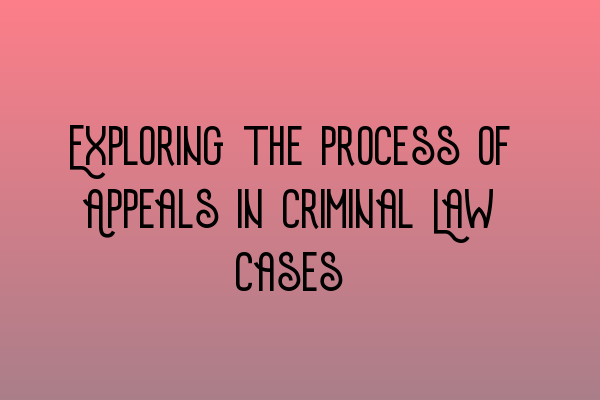Exploring the Process of Appeals in Criminal Law Cases
Welcome to the SQE Criminal Law & Practice Law UK’s blog, where we provide valuable insights into various aspects of criminal law. In this article, we will delve into the process of appeals in criminal law cases, shedding light on the crucial steps involved and the importance of expert representation.
Before we dive into the appeals process, it is essential to understand the concept of appeals in criminal law. An appeal occurs when a party who is dissatisfied with the decision of a lower court seeks to have the decision reviewed by a higher court. The purpose of an appeal is to correct errors in legal proceedings and ensure that justice is served.
The Appeals Process
The appeals process begins with the filing of a notice of appeal. This document formally notifies the higher court that the party intends to challenge the decision of the lower court. It is crucial to adhere to the strict time limits imposed for filing the notice of appeal.
After the notice of appeal is filed, the appellant’s legal team will prepare and submit an appeal bundle to the higher court. The appeal bundle typically includes relevant court documents, transcripts of the lower court proceedings, and any additional evidence or arguments in support of the appeal.
Once the appeal bundle is filed, the next step is the appeal hearing. During the hearing, the appellant’s legal team presents their case, highlighting any errors or irregularities that occurred during the trial or sentencing process. They may also introduce new evidence that was not available or considered during the initial trial.
The respondent, usually the prosecution, will have an opportunity to counter the appellant’s arguments and present their own case in support of the lower court’s decision. It is essential for both parties to have skilled and experienced legal representation to effectively present their arguments.
After the appeal hearing, the higher court will carefully review the arguments and evidence presented by both sides. They will consider the legal principles applicable to the case, precedents, and any other relevant factors before reaching a decision.
If the appeal is successful, the higher court may quash the conviction, reduce the sentence, or order a retrial. On the other hand, if the appeal is unsuccessful, the lower court’s decision will stand, and the appellant may have limited options for further appeal.
Expert Representation in Appeals
Given the complexity of the appeals process and the high stakes involved, expert representation is crucial. Having a solicitor experienced in criminal law and appeals can significantly increase the chances of a successful outcome.
At SQE Criminal Law & Practice UK, our team of skilled solicitors has a proven track record in handling appeals in criminal law cases. We understand the intricacies of the appeals process and have the expertise to identify and argue legal errors effectively.
Our solicitors will meticulously review the lower court’s proceedings, analyze the evidence, and craft compelling arguments for appeal. We leverage our extensive legal knowledge and experience to present a robust case before the higher court, aiming to achieve the best possible outcome for our clients.
Conclusion
In conclusion, the process of appeals in criminal law cases plays a crucial role in ensuring justice is served. It is a complex and multifaceted process that requires expert representation to navigate successfully. At SQE Criminal Law & Practice UK, we have the knowledge, skills, and experience to assist clients in their appeals and fight for a favorable outcome.
If you require assistance with an appeal in a criminal law case, get in touch with us today. We also recommend checking out our related articles on SQE exam preparation, expert testimonies in UK courts, demystifying the solicitors qualifying examination format, SQE exam for international lawyers, and LLC formation made simple for UK entrepreneurs.
